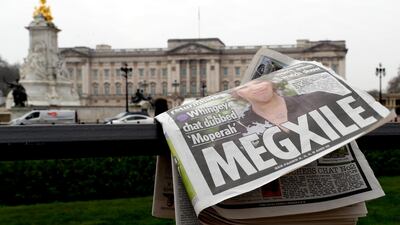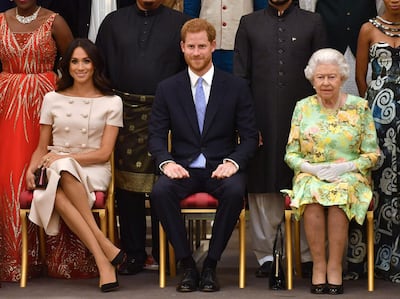It's the juiciest of all soap operas. The heady days of the weekly global shows like Dallas and Dynasty are gone. Game of Thrones is over. Even the Turkish drama Ertugrul, watched by more people than Game of Thrones, is finished. Luckily, we still have the Windsors and Oprah.
Fans of Bollywood and Indian dramas, or possibly just about anyone with a large and complicated family, will have been nodding along to this week’s interview between Oprah Winfrey, Meghan Markle and Harry Windsor earlier this week. They will have recognised all of the politics and dysfunction that Ms Markle and Prince Harry spoke of with respect to their time in the British Royal Family. After all, their drama has all of the staples we are used to: Heroes. Villains. Untimely deaths. A powerful matriarch. A supposedly unruly daughter in law. Sister-in-law squabbles. Racism and colourism. Emotional breakdowns. It’s got it all!
But this isn’t a light-hearted matter, and it is more than just a Bollywood drama or a soap opera that puts front and centre the privileged but dysfunctional lives of this family. In the UK, the Royal Family is unavoidably central to British life due to its role in the constitutional monarchy. It is also the underpinning and epitome of a peculiarly British class system built on privileged birth. The system can only be justified by some sense of “purity” and superiority of genetics. The bloodline is what justifies the privilege, is it not? No wonder those who want to preserve the status quo are so enraged when it’s challenged. And no wonder racism is at the heart of both the denial and the rage.
Globally, millions of others also find themselves invested in this drama. After all, the Royal Family headed up the world’s largest-ever Empire, and remain at the helm of the Commonwealth. As Ms Markle herself pointed out, 60 per cent of its population are people of colour like her. The racism rankles hard.
The story playing out is a modern reinvention of Greek tragedies, where the larger than life kings, queens, gods and goddesses played out archetypes to shed light on the functioning and dysfunction of our society, who we think we are and who we really are. Which makes this a morality tale about all of us.
Anyone wagging their finger that this is a family airing dirty laundry, or questioning in a holier-than-thou way why Harry and Meghan went on global TV for this, is completely missing the point of what is going on here. The he-said-she-said is irrelevant. That’s a side story, only for those interested in family politics and salubrious gossip.
The story here isn’t about which individual you support or agree with, where your sympathy lies or even who – if any of them – is telling an “objective truth”. The actual story here is about a society grappling with radical change attempting to dismantle oppressive systems of class, sex and race. Ms Markle is the embodiment of so many of these changes, and her appearance at the very pinnacle of the system is a lightning rod for these conversations. No wonder she has encountered challenges to her mental health, and my heart goes out to her.
The key is to step back from the petty squabbles. It’s not about the individuals. It’s about those in society who feel that they have no voice. For them, Oprah’s interview will go down as a defining moment that a relatable woman demanded that the voiceless be heard.
Racism isn't always overt. It is couched in hints and concerns, like the concern by an anonymous royal over Meghan’s baby’s skin colour. It allows room for it to be explained away, in this case as “natural curiosity” about a mixed-heritage child. It allows for mealy mouthed explanations that are, in fact, institutional inertia or pushback, which is why it can be so hard to identify and even harder to get agreement about what is happening.
Whatever the truth of it, none of this detracts from the fact that there is an oppressive structure here under intense scrutiny.
In all the sound and fury, something remarkable has happened. Two women of colour held a conversation on their own platform on their own terms with their own voices and they captured the world’s attention, whatever your opinion of them. This is ground-breaking because this is a world where women and women of colour in particular don’t get to do that very often. But Ms Markle and Ms Winfrey didn’t wait for permission to have this conversation. Maybe that’s why so many were so upset.
And the rage comes from knowing that when someone owns their narrative and their voice, rather than being spoken over and denied agency, that is when things start to change.
The real story here isn’t about celebrities and royal families. The reaction the rest of us are having – and whether we do anything to advance societal change or not – is the real story.
Shelina Janmohamed is an author and a culture columnist for The National



